- Home
- Alice Hoffman
Magic Lessons Page 18
Magic Lessons Read online
Page 18
“Does she?” Maria took more notice and recognized the woman as the one who had been speaking to Faith. So she had wanted something after all, and Maria thought it was likely she had come to the cabin to ask for a cure.
Martha introduced herself. She whispered that she was only a neighbor who wished mother and daughter well. “It’s said you have powers. Can you not speak words that would free you or enchant these men?” Martha urged. “Surely you can utter a curse and stop them in their boots. Be rid of them.”
Maria gave her a dark look. “Whoever told you that is what I do is wrong.”
“I mean no harm in saying so. But you don’t want a little one to be taken to that filthy jail,” Martha Chase said, now satisfied that Maria would not or could not defend herself by using the Nameless Art. “There are rats there, sister, who like nothing better than a sweet child. It’s damp and cold and many who walk in do not walk out.”
They had reached the field where the crows had been shot. There were sharp stones littered about that pierced Maria’s feet, or perhaps they were the thin bones of birds. She lifted Faith to carry in her arms. The girl was heavy, for she was already falling asleep, her head tucked against her mother’s shoulder.
“There have been children judged to have carried out witchery,” Martha Chase said. “They are beaten with switches, taken from their homes, treated like common criminals.” Martha had bathed in a wash of salt and vinegar that evening, to make certain she washed away her desire. She was now clean, a good and serious woman with a good deed in mind.
Maria had slowed down, for each step she took brought her closer to the jail. Hannah would never discuss the time when she was incarcerated, when she was believed to have a tail people said was cut off with a carving knife. Her jailors kept her naked, so that they could spy her tail the moment it began to grow back.
“Keep moving.” The first constable scowled, expecting treachery from Maria at any given moment. He wouldn’t be tricked again, and rather than touch Maria he shoved her in between her shoulder blades with the butt of his rifle. The grass was dewy and the hem of Maria’s nightgown was soaking wet. Faith was talking in her sleep, as Samuel Dias had been known to do, and although it was only a murmur, Maria understood her. “I want my dog, I want my bed, I want to sleep until morning.”
“Let me do this for you, sister.” Martha placed a gentle hand on Maria’s arm as she reassured her. “We are both women, and we understand a child’s needs come first. Give your burden to me.”
A drizzle had begun and Maria ran her hand over her daughter’s damp hair. She thought of how chilly a cell would be, for the floors were dirt and the walls bare brick. They were at the edge of the field where there would soon be sunflowers. Maria could hear them growing up through the earth right now.
“You must do so now while you still can,” Martha said. “Before we reach town and it’s too late. Do so and we can both praise God.”
It was dark as ash when Maria gave her daughter over into Martha’s arms. Faith grumbled and Martha hushed her. Maria looked over her shoulder and saw that the wolf was following.
“You’ll take her dog as well,” Maria urged. “She must have him.”
“A dog is the least of your worries.” As Martha leaned in close, Maria picked up the scent of something odd, as if a fire was burning inside of this neighbor of hers. “Make it so they pay attention to your actions and they will not pay attention to mine.”
They were near the homestead of the farmer who’d shot at Maria when he believed she was a witch who could turn herself into a crow. It was here, in the field where Cadin had died, that Maria threw herself onto the ground. She began to utter a curse in Latin; it would not have any effect while she had iron cuffs on, and in fact each word burned her tongue, as if the curse had been reversed, but it was successful all the same. It took attention away from Martha. The constables panicked and gathered round, careful to keep their distance, poking at her with their rifles.
“Rise up now,” the one in charge said. Her nightgown was stained by mud. She glanced over her shoulder as she turned, to see Martha duck behind the farmer’s barn; she spied the shine of her daughter’s red hair. When she arose from the ground, she glared at the constables.
“You had best hope I am not practiced in black magic,” Maria told the men.
Later they would swear she’d had a smile on her face, and that she made the rain fall in torrents, and the toads came in masses through the mud so that the earth itself moved beneath their feet. They could see through the fabric of Maria Owens’ nightgown and soon enough they felt the devil close by, breathing on their necks, rattling their souls. When they saw her young, near-perfect body, it made them think of all they might do to her, and for that they blamed their prisoner. She was the cause of their evil thoughts, and if evil deeds followed, she was to blame as well.
By then there were tears in Maria’s eyes. She looked over her shoulder toward the empty field, and she saw there were indeed the sharp white bones of murdered birds in every furrow. This is the way it began; she knew that from the day Hannah told her that she must run. A woman alone who could read and write was suspect. Words were magic. Books were not to be trusted. What men could not understand, they wished to burn.
* * *
They gave her nothing of comfort in her jail cell, not a blanket or a cup of water. In the morning a woman came with porridge and a jug of water. She was a local woman named Lydia Colson, whose eight-year-old granddaughter accompanied her. Elizabeth Colson was a shy child who always kept her head down to conceal the fact that her face and neck were often covered with a bumpy scarlet rash that grew worse when she was nervous. Lydia had come to Maria on another occasion, desperate for a cure when her darling granddaughter had been stricken with a coughing disease that had caused her to hack up black phlegm, and Maria had given her an elixir of cherry bark and elderberry boiled into a syrup. In time the child had improved, and there had been no charge for the cure. Lydia had not forgotten Maria’s kindness. She’d been told not to speak to the accused, or to look her in the eye, but she had compassion for the prisoner and had brought her a loaf of bread hidden in her granddaughter’s shawl.
“Will you return the favor I once did for you?” Maria begged. “All I ask is that you make certain my daughter is well.”
When Lydia Colson agreed to do so, Maria took her hand. She asked her for one more favor, that she bring a book for her to write in, along with pen and ink. “You can hide it in little Elizabeth’s shawl.” Later in the week, Lydia returned. She hadn’t yet managed to see Faith, but she was able to smuggle in a blue paper journal. In return for this favor, Maria had Lydia bring her granddaughter back into the cell. Once the child and her grandmother were there together, Maria told Lydia to draw a circle of protection around them. Maria was bound by iron, so she had Lydia recite an incantation Hannah had taught Maria which called for good fortune and good health. When Lydia and her granddaughter left the jail that day, the blotchy rash that had always plagued the little girl had disappeared and her skin was clear and fresh. They were silent in the light of this miracle, and when anyone asked, little Elizabeth’s grandmother said the child had fallen asleep in the woods with her face resting on weeds that had a healing property.
Once she was alone in her jail cell, Maria began to write in her journal. She did so with her cuffs in place, biting at her skin. She kept the book hidden behind a loose brick. She wrote for the future, for her daughter and the granddaughters she might have one day.
Beware of love. Know that for our family, love is a curse.
He should have been my enemy, instead I thought I fell in love with him and I made the mistake of declaring my love. I was wrong to think that was love. I was too young to know any different.
The constable’s wife was brought in to cut off Maria’s black hair with a rusty tool she used to shear sheep. Hair was known to make women powerful, and in fact Maria moaned as if in pain while the constable’s wife cut her h
air so short that her scalp shone through. Then she was paraded through town to the courthouse in the sharp sunlight. Maria was still in her muddy nightdress, wearing nothing underneath. Men and young boys came to stare, although when she stared back they quickly glanced away, mortified and shocked by their own dark thoughts. Maria remained in chains, and by now her wrists were bleeding, yet she’d managed to write all night, until there was no longer any ink.
The courthouse on Endicott Street was built of granite brought down from the cliffs of the White Mountains. Maria was chained to her seat to face three magistrates. John Hathorne was among them, and she hoped he would not act against her and that what they’d once had would fill his heart with compassion, but when he looked past her as if she didn’t exist, she knew she was alone here. Maria was asked her name and her date of birth, both of which she gave freely, and then she was asked the name of her husband, to which she replied, “None.” The letter the court had received was then read aloud, accusing her of all manner of evildoing, including turning herself into a crow who flew above the fields, and a succubus who stole the souls of men. In spite of herself, Maria laughed.
“Does this list of evil amuse you?” the oldest magistrate asked.
“I find it to be ridiculous.” She turned to John, who looked away. “Some among you know these are lies,” she dared to say.
“Do women not come to you for potions?”
“For herbs to cure illness, yes.”
“For magic, for vengeance, for spells, for the devil’s work.”
“No.” She was freezing, as if a block of ice had been set upon her. Even now John said nothing. “I’m a healer.”
“Did you not think of enchanting the sheriffs who came for you and consider killing them?” she was asked. But these were not questions, she understood that now, they were statements of facts in these men’s eyes. This is the way it must have begun for Hannah. With lies, with fear, with a man who refused to look at her.
“I did not, sir,” she managed to say.
“Speaking falsely is a sin, you understand,” she was told. One constable had sworn he had a bite mark on his shoulder. The other had been in a fever since he’d touched her.
“Treating someone falsely is a sin as well.” Maria glared at Hathorne. He must have felt her eyes upon him, for at last he returned her glance. It was as though they had never met.
“Thou shalt not suffer a witch to live,” the old magistrate said, quoting from Exodus. It was the same quote used on the title page of The Discovery of Witches, written by Matthew Hopkins, who had overseen the deaths of so many in the first Essex County in England.
A woman in disguise was called into the room; she’d been covered in a veil that reached to the floor to hide her identity. As a witness against Maria, she had pleaded to remain anonymous, fearing for her life. To turn against a witch was dangerous business and her pleas had been answered. When she was seated before the council, she was to respond by nodding, so that Maria would not know her by her voice and curse her. Without the iron cuffs Maria would have known her in an instant through use of the sight, but now this enemy of hers might have been any woman in town. The veiled witness nodded yes to enchantments, yes to a promise of murder, yes to curses, yes to sexual perversities, yes to speaking with the devil. Had she seen her fly? Yes, indeed, she had. Had she seen feathers fall away and flesh appear to cover the witch’s bones? Yes as well. Black plumes sprouting upon her skin? Yes, a thousand times yes.
“You are a liar,” Maria said before she could stop herself. “And you will pay for these lies.”
“Are you threatening witchery right here before us?” the chief magistrate asked.
“Where is her proof?” Maria wished to know.
“Her proof is the word of a God-fearing woman.”
Maria sat back in her chair. Hannah had told her how God-fearing people had nailed her cat to her front door while it was still alive. How they had given her moldy bread and no water in jail. How she’d been stripped and searched to see if she had a tail. Already the metal cuffs had drawn blood on Maria’s wrists, black blood that was burning through the wooden floor. Let no one see it, let no one know, Hannah had warned her, should her fate ever lead her to a prison cell. Do not speak or argue. Do not proclaim your innocence. They want you to be guilty, they want to mock your sins, they want to keep you in irons, and they would most certainly like to see you burn.
* * *
The trial lasted three days, during which time there were several accusers, some Maria knew and others she had never seen before. The farmer who had shot her; a woman who had lost her sight and insisted Maria had climbed through her bedchamber window, causing her to go blind so the witch could have relations with her husband; the husband himself, who agreed and wore a blindfold so he would not have to look at Maria and perhaps fall under her spell yet again; a local fruit vendor, who had tried to sell her rotted lemons, for which she had refused to pay.
John Hathorne was the one who said she should not be kept in her nightdress, and in truth, many of the wives in town had complained. There were scabs on her wrists from the rubbing of the metal against flesh. Lydia Colson managed to sneak her another small bottle of ink, and all night she attended to the blue journal.
Wherever you are, she wrote to her daughter, I did not wish to leave you.
She was guilty, proven so by spectral evidence, rumor, and gossip that could not be proved, only believed, based on nothing more than a random bite mark, or a black crow feather, or a man who swore she had come to him in his dreams. They intended to test her by water. If she was a witch she would float, if she was a woman she would drown. Either way, she was likely to die. They fitted her with a pair of heavy black boots filled with stones that would sink any normal woman, and she was made to wear a white garment with pockets in which she could carry more stones. She was so weighed down she could not walk and had to be carried to the chair she was then tied to. They were at the lake that had no bottom, with its weedy shore and dark water. Maria gazed at the green leaves on the trees, wondering if they would be the last beautiful things on earth that she would ever see. She recited her daughter’s name, her mother’s name, and Hannah’s name. None of the names were said aloud, but her lips moved quickly, in a silent chant. Certain people in the crowd swore she was calling down an incantation and that all of Salem would pay a price for what they did on this day when there were damselflies drifting over the black water, when the sun was strong, when those who had doubts did not dare to come forward lest they be accused of giving aid and solace to a witch.
They carried her chair into the water, though the men who did so quaked with fear, for they all believed there was a monster in the lake. Still, they went deeper, convinced that the devil might appear before them if they called him by his name. They were up to their ankles, then up to their knees, then they pushed the chair out into the water, the bottomless depths, where stray lilies floated, creamy white blooms on pads whose tendrils reached toward shore, wrapping slimy strands around the men’s legs so that it seemed they might be pulled down as well until they charged backwards.
In the middle of the lake, the chair began to sink. The stones carried Maria down, for no witch could float when she was so weighted with rocks. For Maria the whole world turned green, the green leaves of the trees above her and the green water rising over her. She wished for one thing and one thing alone, to see her daughter, and yet she was grateful that Faith was not there and would not have to see her own mother murdered. Once you witness such brutality, it can never be unseen; it changes who you are and takes your childhood from you. It had happened to Maria when she stood on a hillside and watched Hannah’s house burn. For hours she had cried, but the smoke had turned her tears black, and she realized that her weeping would never bring back what she had lost.
From under the water, Maria could spy the men on the grassy bank of the lake in their black coats. She viewed them as though they were the ones dissolving before her eyes. Fish
floated by, small bright silver shadows. She would have no choice but to give up; it was impossible to fight the strength of water. When the serpent came to her, she felt it before she saw it, winding its way past her legs. It was not scaly but smooth, reminiscent of the cover of her Grimoire. The creature had adapted to this lake, eating frogs and leeches, but it had also been fed crusts of bread from Faith’s hands and so it had been tamed. A creature that knows kindness can repay such deeds. The serpent swam beneath the chair, lifting it up through the green bubbles. On the banks the men blinked and stepped back when they saw the chair rising and moving toward the shallow water. Riding there, like a queen tied to her throne, was Maria Owens, nearly naked in her wet garment. She looked like an angel, but this was clearly the devil’s work, for it went against nature. A woman tied to a chair must drown, and this was not the case.
Maria spat out water. The ropes had slid from her, and she stood with her feet in the mud. There were women in the crowd who fainted straightaway at the sight of her, now safely on the shore, and men who sank to their knees. Maria walked past the water lilies in the shallows, then went through weeds that were as tall as a man. Beasts could be humane, and men could be devils, Hannah had told her. Beware of those in power, of kings and judges and men who think they own you. If Maria hadn’t been wearing iron cuffs, she would have caused the grass the magistrates stood upon to burn beneath their boots, but her natural talents were blocked by iron; she could not resist when they grabbed her and covered her in sackcloth so she could not work her evil upon them. They turned the fact that she had not drowned against her, declaring that she had given them all the proof they needed. She was a creature who couldn’t be drowned, who called monsters and beasts to her and brought forth all the most foul urges in men. What they had in their grasp was a witch. By living, she had proven that she was an emissary from the dark and invisible world.

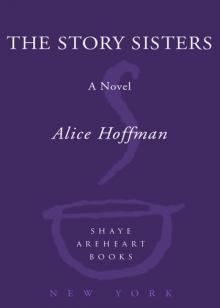 The Story Sisters
The Story Sisters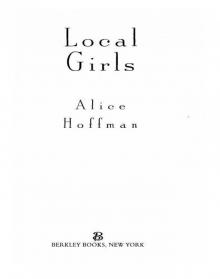 Local Girls
Local Girls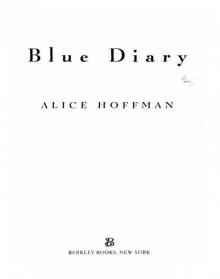 Blue Diary
Blue Diary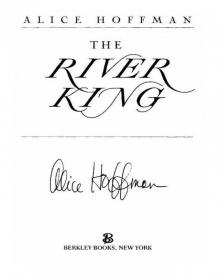 The River King
The River King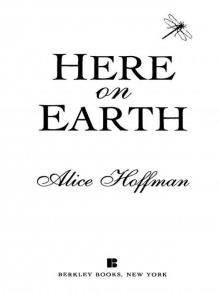 Here on Earth
Here on Earth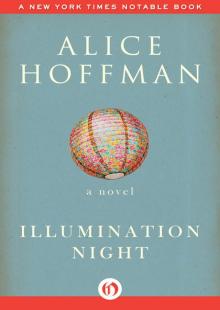 Illumination Night: A Novel
Illumination Night: A Novel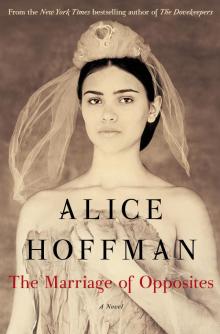 The Marriage of Opposites
The Marriage of Opposites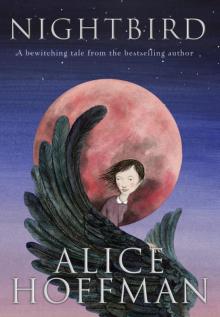 Nightbird
Nightbird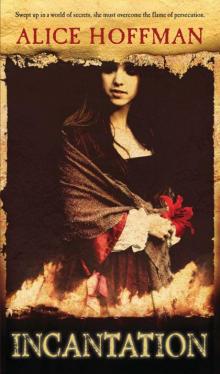 Incantation
Incantation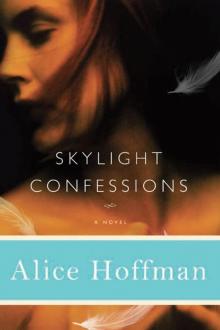 Skylight Confessions
Skylight Confessions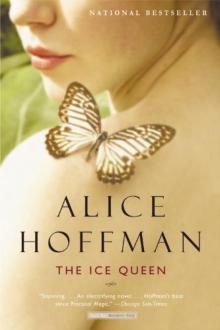 The Ice Queen
The Ice Queen Second Nature
Second Nature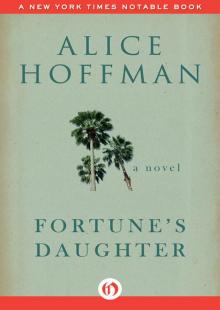 Fortune's Daughter: A Novel
Fortune's Daughter: A Novel Seventh Heaven
Seventh Heaven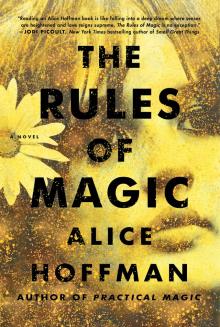 The Rules of Magic
The Rules of Magic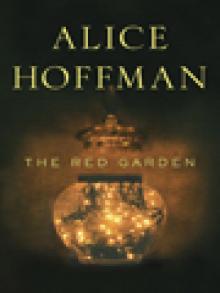 The Red Garden
The Red Garden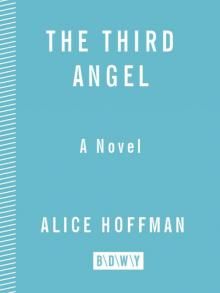 The Third Angel
The Third Angel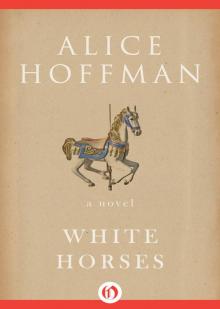 White Horses
White Horses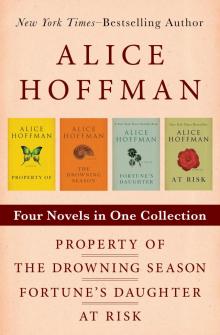 Property of / the Drowning Season / Fortune's Daughter / at Risk
Property of / the Drowning Season / Fortune's Daughter / at Risk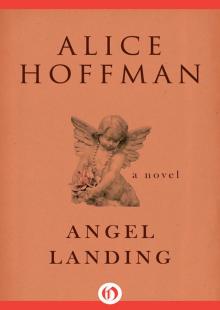 Angel Landing
Angel Landing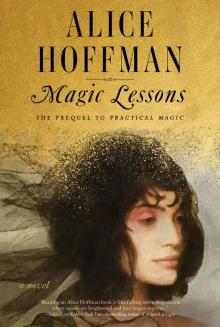 Magic Lessons
Magic Lessons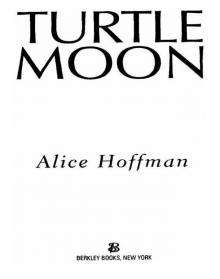 Turtle Moon
Turtle Moon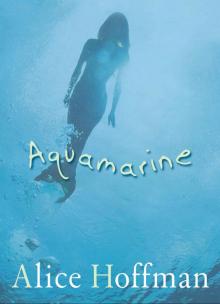 Aquamarine
Aquamarine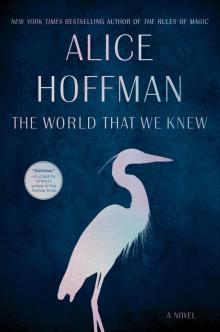 The World That We Knew
The World That We Knew Faithful
Faithful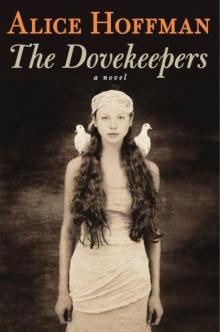 The Dovekeepers
The Dovekeepers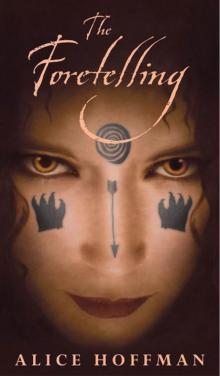 The Foretelling
The Foretelling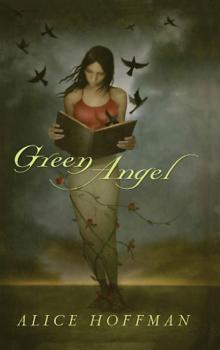 Green Angel
Green Angel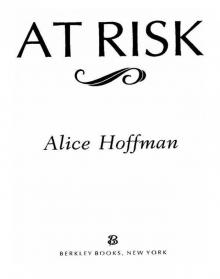 At Risk
At Risk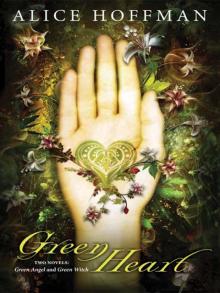 Green Heart
Green Heart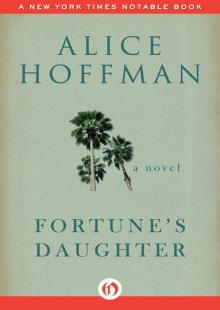 Fortune's Daughter
Fortune's Daughter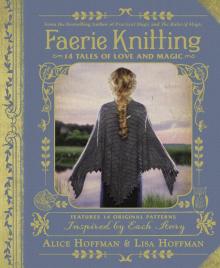 Faerie Knitting
Faerie Knitting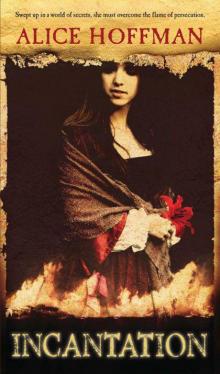 Incantation (v5)
Incantation (v5)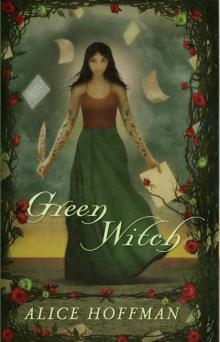 Green Witch
Green Witch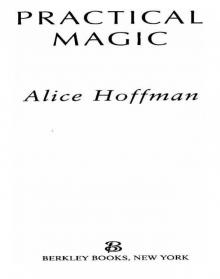 Practical Magic
Practical Magic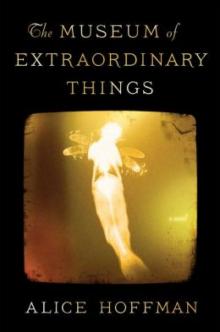 The Museum of Extraordinary Things
The Museum of Extraordinary Things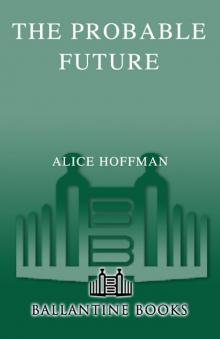 The Probable Future
The Probable Future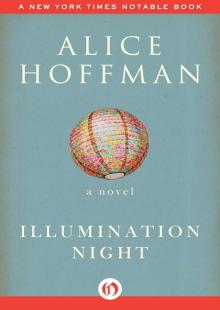 Illumination Night
Illumination Night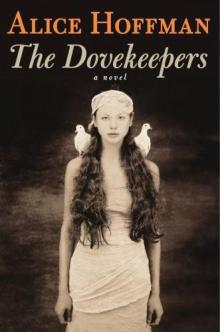 The Dovekeepers: A Novel
The Dovekeepers: A Novel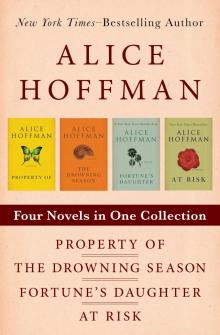 Property Of, the Drowning Season, Fortune's Daughter, and At Risk
Property Of, the Drowning Season, Fortune's Daughter, and At Risk